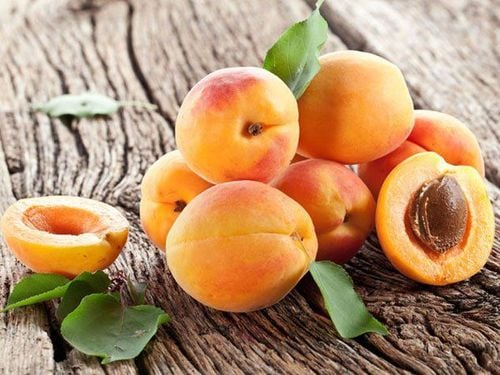This is an automatically translated article.
Not only is a delicious fruit, apricots also contain many healthy nutrients, notably high vitamin content and abundant antioxidants.
1. Are apricots good?
Apricots are nut, spherical, yellow in color, with a mild sweet-sour aroma and taste. In Eastern medicine, apricots are called apricots, and the sour taste is average. Green apricots are called apricots. The dried, dark-colored apricot bar is called apricot.
Is it good to eat apricots? In addition to being a delicious fruit, apricots also have many nutrients that are very good for health. In 100g apricot contains 8.5% carbohydrate, 5% fiber, 2.5% protein, 1% fat, 64% vitamin A, 16% vitamin C, 3% vitamin K, 5% iron, 0% cholesterol. In addition, apricots also contain plant compounds with antioxidant effects such as lutein, zeaxanthin, lycopene, vitamin E; Flavonoids such as quercetin, catechin, chlorogenic acid... In the apricot solution, vitamin B15 (pangamic acid) was also found in a rather high rate. This is an active ingredient that works very well in the process of cell metabolism, anti-aging of cells.
2. What is the effect of eating apricots?
What is the effect of eating apricots? With such a rich nutritional composition as above, here are some outstanding uses of apricots that have been proven:
2.1. Increase resistance, slow down the aging process Apricots are low in energy, rich in vitamins, fiber, minerals, especially rich in antioxidants to help increase resistance, inhibit free radicals in the body, prevent prevent aging and disease.
Flavonoids in apricots such as catechin, quercetin, chlorogenic acid help relax nerves, control weight effectively. Eating apricots regularly will help reduce stress, reduce free radicals, and prevent chronic diseases.

Quả mơ giàu vitamin, chất xơ, khoáng chất và giàu chất chống oxy hóa giúp tăng cường sức đề kháng cho cơ thể
2.2. Prevent constipation, improve intestinal health Is it good to eat apricots? Apricots are rich in fiber, which helps prevent constipation, hemorrhoids, anal fissures and other digestive disorders such as abdominal pain, diarrhea, etc. The fiber in apricots includes soluble fiber (polysaccharide, pectin). and insoluble fiber (lignin, cellulose and hemicellulose). These fibers, when entering the intestine, will absorb water, increase stool volume, and at the same time stimulate intestinal peristalsis to increase contractions to expel stool. Fiber also creates a favorable environment for beneficial bacteria in the intestine to grow, helping to enhance digestion and absorption in the intestine.
2.3. Apricots help protect eye health Vitamin A and vitamin E in apricots are essential components to help protect eyesight. Vitamin A helps promote vision in low light while protecting and maintaining the cornea (the outermost layer of your eye) and the conjunctiva (the thin membrane that covers the surface of your eye and the inside of your eyelids). Vitamin E is a powerful antioxidant that protects the eyes from free radical attack.
Besides, zeaxanthin and lutein in apricots also play an important role in eye protection. These are the two main components that make up the yellow thing of the eye. Adequate supplementation of zeaxanthin and lutein helps the eyes to see things clearly, without having to adjust much, avoiding fatigue and reducing the risk of eye diseases.
2.4. Apricots are good for pregnancy health The nutritional components in apricots are very good for pregnancy health. Iron present in apricots helps prevent anemia for mother and fetus. Apricots also contain folic acid, which helps prevent some brain and spinal defects in the unborn baby. The rich vitamin and mineral content in apricots helps the fetus develop.
2.5. Apricots help to beautify skin The high content of antioxidants in apricots helps nourish and prevent skin aging. Vitamins E and C in apricots also help stimulate collagen production, making the skin smooth and firm.

Vitamin E và C trong quả mơ giúp làn da của bạn mịn màng và săn chắc
2.6. Apricots are good for patients with diabetes. Apricots are low in calories and carbohydrates, so they are suitable for diabetics. The high fiber content in apricots also helps regulate blood sugar. In addition, the antioxidants in apricots help prevent oxidation and protect the pancreas.
2.7. Apricots are good for heart health A diet rich in potassium has many benefits for heart health, helping to lower blood pressure and reduce the risk of stroke. A study done on 128,644 people found that those who ate the most potassium had a 24% lower risk of stroke than those who ate the least. Apricots are high in potassium, regularly adding apricots to the diet will help regulate blood pressure and prevent other cardiovascular diseases. Potassium in apricots also helps maintain nerve function.
Because the skin of apricots contains many nutrients, when eating apricots, you need to soak them thoroughly and eat the whole shell, removing the seeds inside. You can eat apricots directly like other fruits or add to yogurt, fresh milk to form delicious smoothies. In addition, for long-term preservation of apricots, you can process apricots into apricots, which are both a nutritious snack and help support the treatment of coughs, sore throats, colds, etc. Can be processed into sugar-soaked apricots to quench thirst in the summer.
Please follow the website ( www.vinmec.com ) for more information on health care instructions, which we will update regularly.
Please dial HOTLINE for more information or register for an appointment HERE. Download MyVinmec app to make appointments faster and to manage your bookings easily.













